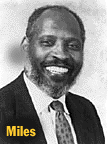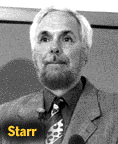|
|
Originally published in Current, Jan. 24, 2000
By Steve Behrens
Seventeen million dollars slipped through WQED's fingers last week when a partner in its long-delayed deal to sell sister channel WQEX abruptly backed out, even though they had won a go-ahead at the FCC a month earlier.
George Miles, president of the Pittsburgh station, paraphrased a newspaper report on the turnabout: "We have snatched defeat from the jaws of victory."
Important issues about pubcasting's reserved channels were at stake in both WQED's victory and its defeat, but they got little attention as all eyes turned to a couple waves of explosive controversy surrounding the FCC decision:
First, in mid-December [1999], reporters swarmed over the news that Presidential candidate and FCC overseer Sen. John McCain had intervened to hurry up the FCC decision on behalf of Paxson Communications, a campaign contributor that was part of the three-way WQEX deal.
Then, at the end of the month, religious broadcasters recoiled and conservative politicians raged when the FCC spelled out its thinking behind its WQEX decision. This week, Rep. Michael Oxley (R-Ohio) and 42 or more co-sponsors will introduce a bill to undo the FCC's new guidelines for religious broadcasters on reserved educational channels.
The denouement came Jan.18 [2000], when religious broadcaster Cornerstone TeleVision backed out of the WQEX deal, unwilling to accept FCC restrictions on its programming. It could legally walk away because the three-way pact between WQED, Cornerstone and Paxson had expired Dec. 31--a timepost that also seems to explain why Paxson had McCain pushing the FCC for quick action.
The QED Accountability Project, co-chaired by Jerry Starr and Linda Wambaugh, cheered the collapse of the station deal. "Obviously, we're delighted that Channel 16 is still available to citizens of Pittsburgh for educational purposes," said Starr. If WQED can't afford to operate its second channel, he suggested that it give the channel to others who would. Miles says WQED has about eight options, but has not decided which to follow. Selling Pittsburgh magazine, another valuable asset, isn't one of them, he told reporters.
Burdened by old debts, WQED originally tried to sell Channel 16 outright, but the FCC in July 1996 refused to raise the market value of the channel by removing the noncommercial reservation. Miles moved to Plan B: WQED would swap reserved Channel 16 for Cornerstone's unreserved Channel 40, and then sell 40 to Paxson. The $35 million proceeds would be split between WQED and Cornerstone. The partners in the deal asked the FCC for permission in 1997.
Two years later, they were getting impatient. The QED Accountability Project and allies had raised a range of issues against parties to the deal, and the commission had made inquiries about a few. The commission seemed divided. The parties began enlisting congressmen to push for action. McCain, whose committee oversees the FCC, got action after two letters.
Wave No. 1: the press reacts
The senator wrote to Chairman William E. Kennard on Nov. 17, requesting that the commission act on the WQEX deal in December or explain immediately if they couldn't. When they didn't act, he wrote again Dec. 10, asking why. Kennard replied Dec. 14 that he was concerned that inquiries "at a sensitive time in the deliberative process" could affect due process. But the commissioners took up and approved the Pittsburgh station swap/sale the next day.
Starr found that Paxson had contributed to the McCain campaign and tipped off reporters, who nailed the senator with their favorite storyline: irony, if not hypocrisy.
Walter V. Robinson of the Boston Globe reported Jan. 5 that McCain wrote his FCC letters on the request of Paxson's lobbyist "during a period when he used Paxson's corporate jet four times to travel to campaign events--where he almost always attacks monied special interests." Paxson officers and family members had contributed $12,000 to McCain's campaign, the newspaper reported.
The senator said he was just trying to get fair treatment for applicants, but it looked suspicious "because there is so much money washing around," he said, according to the New York Times. Starr asked the commission to investigate whether there had been improper lobbying during an FCC proceeding. Angela Campbell, attorney for Starr and allies, told Current that Paxson's lobbying, through McCain, amounted to improper communication forbidden by the FCC's ex parte rules. Though the FCC announced its Pittsburgh decision Dec. 15, the second wave of reaction didn't develop until it published its detailed order Dec. 29. The commission systematically rejected most charges by the QED Accountability Project and the Alliance for Progressive Action against WQED and Cornerstone, saying they were "unsupported," "not relevant," not under FCC jurisdiction, or not serious enough. It declined to pass judgment on Cornerstone programming said to be "inflammatory and false."
Its strongest finding against WQED was that the station illegally accepted paid advertising backing a 1997 referendum favored by Miles. The commission admonished but did not fine WQED because the station had admitted its error and moved to remedy it by also airing spots opposing the ballot initiative. Though it okayed the Pittsburgh deal, the FCC acknowledged that its rules don't go very far in defining what programming is adequately "educational" for reserved channels. Its toughest rule about educational TV applicants was that "the proposed stations will be used primarily to serve the educational needs of the community."
Over the objection of Republican members Harold Furchtgott-Roth and Michael Powell, the commission enunciated "additional guidance":
- "More than half of the hours of programming aired on a reserved channel must primarily serve an educational, instructional or cultural purpose in the station's community of license."
- To be counted, such a program "must have as its primary purpose service to the educational, instructional or cultural needs of the community."
- The commission will defer to the broadcaster's judgment on categorization of programming unless it "appears to be arbitrary or unreasonable."
- The FCC "will not disqualify any program simply because the subject matter of the teaching or instruction is religious in nature."
- "Programming primarily devoted to religious exhortation, proselytizing or statements of personally held religious views and beliefs general would not qualify as 'general educational' programming."
- Reserved channels are intended to be "responsive to the overall public as opposed to the sway of particular political, economic, social or religious interests." [Full text of "Additional Guidance"]
On the separate issue of noncommercial operation, the FCC said Cornerstone was aware that it would have to adjust some of its programming to be adequately noncommercial when it moved to the reserved channel.
The five-member commission, so reluctant to act on the Pittsburgh deal, turned out to be split, with Susan Ness as the swing vote. Though she sided with fellow Democrats Kennard and Gloria Tristani on the "additional guidance," judging from her own statements, she joined the two Republicans to okay the Pittsburgh swap. Starr points out that confirmation of Ness's reappointment to the FCC is pending in McCain's committee. [Texts of commissioners' statements]
Wave No. 2: the conservatives react
The FCC believed it had stayed away from dictating program decisions, but it came too close for religious broadcasters. Brandt Gustavson, president of National Religious Broadcasters, predicted the FCC will find it "difficult, if not impossible" to draw a line between education and exhortation. "The order contains a disquieting implication that the government may restrict certain strains of religious speech--disfavoring more passionate and emotional expressions of faith--while not constraining others that are more 'intellectual' and drained of human emotion."
Reps. Oxley, Chip Pickering (Miss.), Steve Largent (Okla.) and Cliff Stearns (Fla.) told Kennard in a letter Jan. 12 that the December order interferes with religious expression and would "force religious broadcasters seeking to hold a noncommercial license to cut back on traditional religious programming."
But few outsiders realized that Cornerstone leaders were so concerned by the FCC order that they would give up $17.5 million. Last week was a roller-coaster ride for WQED, Miles said. The station was savoring its FCC victory and enjoying favorable publicity about the first episodes of its new weeknightly magazine show, On Q. Its persistent opponents were considering a court appeal.
Late on Jan.. 18, Cornerstone told the FCC it was dropping the swap/sale plan it had fought for. The FCC order "would have seriously jeopardized our ability to carry out our mission ... which requires us to broadcast programming that involves Christian exhortation evangelizing."
"We just feel the climate at the FCC right now is hostile to our needs," Cornerstone President Oleen Eagle told the Pittsburgh Post-Gazette. "We can't take the risk of losing our license later because of something they don't approve of."
Oxley commended Cornerstone "for its refusal to yield to the FCC's marching orders."
"Shock jocks and obscene lyric are broadcast every day in our nation," his press release said last week, "and ironically the FCC chose to single out programming that expresses faith . . ."
He said he would introduce this week the Religious Broadcasting Freedom Act, a short bill that would order the FCC not to impose the "additional guidance" in its WQEX order and would forbid it to modify noncommercial service rules without a full rulemaking. [Full text of draft bill]
Starr, who now heads the new group Citizens for Independent Public Broadcasting, based in Washington, vowed to pursue the same subject from the opposite side: broadcasters on reserved channels who are neither educational nor noncommercial. The FCC order was not "discrimination against religion," Starr said. "It is simply a defense of education and a demand that the FCC observe its mandate to protect the public interest."
![]()
 Earlier news: FCC turns down WQED request to de-reserve and sell second
channel, 1996.
Earlier news: FCC turns down WQED request to de-reserve and sell second
channel, 1996.
![]() Even earlier news: WQED falls into debt and its president resigns in the
early 1990s.
Even earlier news: WQED falls into debt and its president resigns in the
early 1990s.
 Outside links:
Web sites of WQED, Cornerstone
TeleVision, Citizens for Independent
Public Broadcasting
Outside links:
Web sites of WQED, Cornerstone
TeleVision, Citizens for Independent
Public Broadcasting
![]()
Web page created Jan. 22, 2000
Current
The newspaper about public television and radio
in the United States
A service of Current Publishing Committee, Takoma Park, Md.
E-mail: web
301-270-7240
Copyright 2000



 To Current's home page
To Current's home page Later news: Faced with legislation opposition, FCC reconsiders and drops
"additional guidance," January 2000.
Later news: Faced with legislation opposition, FCC reconsiders and drops
"additional guidance," January 2000.